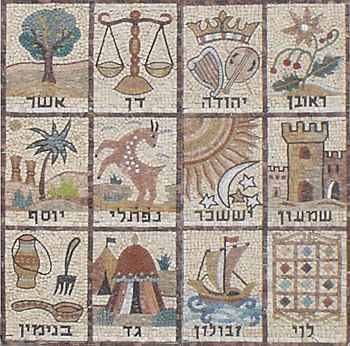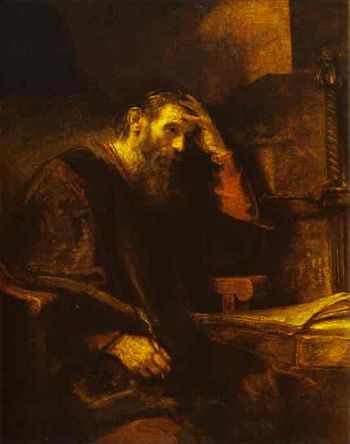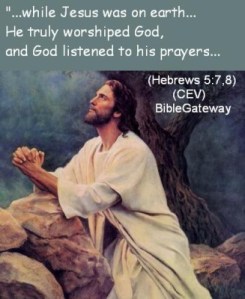There was a lovely harmony in the Garden of Eden. Man was free to walk around and live nicely. He also was free to think and to make choices. There it went wrong. The woman let her mind wander and got tempted by her thoughts, willing to know more.
We have seen that the yielding to the tempter or man’s mind doubting God‘s honesty is treated allegorically in the Edenic covenant as the serpent in the flesh. First man was full of life but now death had come to him. Temptation had taken over and evil had entered his mind. This evil is the “devil” or diabolos of the New Testament, which term is defined as “that which has the power of death” (Hebrews 2:14), elsewhere described as “the law of sin and death”, “sin that dwelleth in me”, “sin in the flesh” (Romans 7:20; Romans 8:2-3).
Hebrews 2:14-15 NHEBJE Since then the children have shared in flesh and blood, he also himself in like manner partook of the same, that through death he might bring to nothing him who had the power of death, that is, the devil, (15) and might deliver all of them who through fear of death were all their lifetime subject to bondage.
Eve was taken in by her thoughts which proofed not to be good thoughts. Those ideas opposing God’s Wishes are considered bad thoughts. Going against God His Will is as declaring yourself to be against His ideas and opposing Him or to rival God, taking on the position of an opponent of God or an adversary (satan) of God.
 Evil thoughts got so much power in man that it brought death to them but also put its stamp on all the rest of mankind. The act of the first two human beings created an awful situation for us. The curse of death having come over man also brought plants and animals in danger. Because now the mind of man was filled with darkness and their way of thinking became so blurred that often they would take the wrong decisions. At the beginning of the universe man had received the plants as food, meaning they had to be vegetarians or veganists. By the years following their expulsion from the Garden of Eden they were not happy any more by eating only plants and wanted also to eat meat, also becoming more like the animals, a carnivor. By doing so they also became killers of animal. They had taken their power to be master over plants and animals to be able to kill other living beings. Evil or badness in this way creped further in their life and as such evil or satan has become master or chief ruler of this world now. The enmity against God was so strong it became deeply rooted in the next generations. Paul described how that this “warred against the law of my mind” (Romans 7:23), and in doing so gave expression to the enmity described by God in the 15th verse of Genesis 3.
Evil thoughts got so much power in man that it brought death to them but also put its stamp on all the rest of mankind. The act of the first two human beings created an awful situation for us. The curse of death having come over man also brought plants and animals in danger. Because now the mind of man was filled with darkness and their way of thinking became so blurred that often they would take the wrong decisions. At the beginning of the universe man had received the plants as food, meaning they had to be vegetarians or veganists. By the years following their expulsion from the Garden of Eden they were not happy any more by eating only plants and wanted also to eat meat, also becoming more like the animals, a carnivor. By doing so they also became killers of animal. They had taken their power to be master over plants and animals to be able to kill other living beings. Evil or badness in this way creped further in their life and as such evil or satan has become master or chief ruler of this world now. The enmity against God was so strong it became deeply rooted in the next generations. Paul described how that this “warred against the law of my mind” (Romans 7:23), and in doing so gave expression to the enmity described by God in the 15th verse of Genesis 3.
Romans 7:23 NHEBJE but I see a different law in my members, warring against the law of my mind, and bringing me into captivity under the law of sin which is in my members.
God talking about the seed to come (a seed of a new generation), wanted mankind a solution for what they had caused and for those who had nothing to do with that first fault or wrong choice of Adam and Eve. God had asked not to touch nor to eat from the tree, which was a law for man. They ignored it, but with it they also did not listen to God. Also later the many Laws provided by God to guide man, got ignored. Through the flesh every law would be weak. But the seed or the send one from God was to show the world that he who also was in the likeness of sinful flesh, and for sin, condemned sin in the flesh, would be able to follow the Laws of God, not doing his own Will, but continually doing the Will of God. The action or attitude of that seed was going to contradict the thoughts of those taken by that ‘hissing in the mind’, the ‘serpent‘ or ‘evil’, the adversary of God, satan or the devil. Those coming after Adam and Eve also would have the choice to be after the flesh either to mind the things of the flesh or to love the things of the flesh. The loving harmony which subsisted between the Father and the son restored the relationship between God and mankind and could again bring liberation in the condemnation of sin in the flesh.
Romans 8:3 NHEBJE For what the law could not do, in that it was weak through the flesh, God did, sending his own Son in the likeness of sinful flesh and for sin, he condemned sin in the flesh;
Though there is constant enmity or animosity between the lusts of the flesh and the requirements of God as set down in His law those who would come into the seed of the woman and would follow his teachings could make themselves stronger and become once again in the spiritual life or after the Spirit (o. pneuma) or the things of the Spirit (o. pneuma) . In order to be carnally minded is death; but to be spiritually (o. pneuma) minded is life and peace.
Romans 8:5-10 NHEBJE For those who live according to the flesh set their minds on the things of the flesh, but those who live according to the Spirit, the things of the Spirit. (6) For the mind of the flesh is death, but the mind of the Spirit is life and peace; (7) because the mind of the flesh is hostile towards God; for it is not subject to God’s law, neither indeed can it be. (8) Those who are in the flesh cannot please God. (9) But you are not in the flesh but in the Spirit, if it is so that the Spirit of God dwells in you. But if any man does not have the Spirit of Christ, he is not his. (10) If Christ is in you, the body is dead because of sin, but the spirit is alive because of righteousness.
That the serpent is used allegorically of sin is shown by the punishment meted out to Israel when the people “spake against God, and against Moses” (Numbers 21:5). Serpents appeared among the people, the sting of which proved fatal (cp. 1 Corinthians 15:56), so that “much people of Israel died”.
1 Corinthians 15:56 NHEBJE (56) The sting of death is sin, and the power of sin is the law.
In panic, the rest of the people appealed to Moses for help, and he interceded with God on their behalf. He was told to make a serpent of brass, and to set it on a pole, so that the people might view it. All who did so in faith were saved from the death that threatened them. The serpent on the pole illustrated to the people what they should do to the “serpent” within (the carnal mind that inflamed lust): they must crucify it if they would live.
The serpent or evil could put the seed on the pole, Jesus Christ being put to death, as a symbol of bringing the curse of evil and death to its end, Jesus vanquish evil by giving his unblemished body as a ransom for all who had that sin of the flesh. His decision only to follow God His Will has overcome the fault of those who followed their own will, ignoring God’s Will.
Unlike the active serpents on the ground, there was no venom in the serpent on the pole (not by Moses, not by Jesus Christ); similarly sin must be neutralised in us if we would live. At the time of Moses the serpent on the pole could also representing that seed promised in the Garden of Eden,the Lord Jesus Christ who came in the nature common to all. On several occasions he compared his crucifixion with the “lifting up” of the serpent in the wilderness (John 3:14-16; John 8:28; John 12:32), thus identifying his nature with the allegorical significance of the serpent.
John 3:14-21 NHEBJE As Moses lifted up the serpent in the wilderness, even so must the Son of Man be lifted up, (15) that whoever believes in him may have eternal life. (16) For God so loved the world, that he gave his one and only Son, that whoever believes in him should not perish, but have eternal life. (17) For God did not send his Son into the world to judge the world, but that the world should be saved through him. (18) He who believes in him is not judged. He who does not believe has been judged already, because he has not believed in the name of the one and only Son of God. (19) This is the judgment, that the light has come into the world, and men loved the darkness rather than the light; for their works were evil. (20) For everyone who does evil hates the light, and does not come to the light, lest his works would be exposed. (21) But he who does the truth comes to the light, that his works may be revealed, that they have been done in God.”

We do live in a time now that people should be able to see who God has send to the earth and has lifted up. Today there are still too many, even people who call themselves Christian, who do not want to believe Jesus is that seed God has promised and send to the earth. They still do not want to believe Jesus is really the son of God and not a god son. They still do not want to accept that Jesus did not his own will (which he would have done when he is God) and and that he did nothing on his own authority, but spoke just as his heavenly Father taught him.
John 8:28-29 NHEBJE Jesus therefore said to them, “When you have lifted up the Son of Man, then you will know that I am he, and I do nothing of myself, but as the Father taught me, I say these things. (29) He who sent me is with me. The Father hasn’t left me alone, for I always do the things that are pleasing to him.”
John 12:32 NHEBJE And I, if I am lifted up from the earth, will draw everyone to myself.”
In the seed, which always did only those things that pleased Jehovah God, would come power to battle the evil. All those who would come to recognise that seed and would come under it, multiplying in unity trying to put away those fleshly lusts would be able to put their flesh to death at the stake to gain life in the mind of Christ.
+
Preceding articles
A multifold of elements in creation and a bad choice made
First mention of a solution against death 1 To divine, serpent, opposition, satan and adversary
First mention of a solution against death 2 Harm or no harm and naked truth
First mention of a solution against death 3 Tempter Satan and man’s problems
First mention of a solution against death 4 A seed for mankind
Next: First mention of a solution against death 6
++
Additional reading
- Trusting, Faith, calling and Ascribing to Jehovah #3 Voice of God #6 Words to feed and communicate
- The Seed Of The Woman Bruised
- Jesus begotten Son of God #10 Coming down spirit or flesh seed of Eve
- Sayings of Jesus, what to believe and being or not of the devil
- A question to be posed
- Which man is mentioned most often in the Bible? Jesus, Moses, Abraham or David?
- Who is on the Lord’s side
- Chaff and the shoot out of the stock of Jesse
- Seeing or not seeing and willingness to find God
- The God of hope filling us with all joy and peace
- A book of life and a man born more than two thousand years ago
- Not about personal salvation but about a bigger Plan
- True riches
- Let us become nothing, and Christ everything
- Deliverance and establishement of a theocracy
- Solution for Willing hearts filled with gifts
- Looking for something or for the Truth and what it might be and self-awareness
- Message from the family tree in the Tanakh
- Set free from any form of mental torment or self-condemnation
- Were allowed to willfully break the Law of Moses
- God loving people justified
- No curtain placed over tomorrow
- Has the Bible’s Garden of Eden been found — and restored
- A promise given in the Garden of Eden
- Around pre-existence of Christ
+++
Further reading
- Where Did We Get Our Sinful Nature?
- “Where are you?” N:o 25 The enmity in the history
- As a believer your body is the temple of the Holy Ghost
- The Truth About Being Born Again
- Walking in the Spirit
- Be Still
- Covenant and the law (Sir 24:23-24:23)
- Looking at the Ocean and Seeing God’s Hand
- Signs from God
- Prophet Moses’ Obedience to Ishmaelite Prophet Jethro
- Anatoly of Optina: “Wherever God is — there is peace.”
- Debtor
- Enmity
- From The Heart The Mouth Speaks
- The Fight You Won’t Win
- Addiction #05 — Eating Animals (05/27/12)
- Men think they need to eat meat to be manly—and it’s making them sick
- How humans are not physically created to eat meat
+++
























